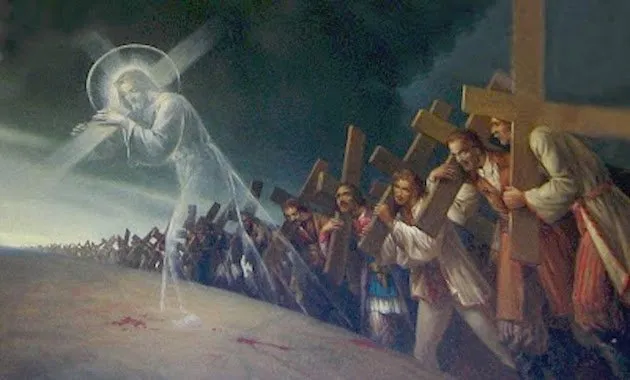Do you love me?
I saw a suggestion online for some different clerical wear for this Sunday. However if I had turned up wearing a dark robe with a black helmet and black mask and breathing stertorously, some of you might have got the Star wars reference and perhaps one or two might have linked it to “May the 4th.” A play on that star wars blessing “May the force be with you”. It would have suggested who I followed and something about my discipleship. However, being a disciple of Christ and a priest in His church, I elected instead to wear my alb, my white baptismal robe and the stole, the yoke of service; the chasuble symbolising charity, the yoke of Christ, and the seamless garment Christ wore, reflecting the unity of the Church and Christ's sacrifice.
How does your discipleship of the risen Christ express itself? How does our discipleship as a church affect how we behave and the choices we make?
What is discipleship? We can find some of the answers to this in both the Acts and the Gospel story today. On the internet we are familiar with the idea of hyperlinks. You come across a word that is in bold, in colour and sometimes underlined and as you hover the mouse pointer over it, the arrow changes to a hand - you click and it takes you to another webpage. The Bible is full of things which act like hyperlinks - words, images, ideas and themes which, as you hover over and meditate on them, take you to other parts of the Bible.
Our gospel story today is full of such hyperlinks. First - the fish. In John, the calling of Jesus’ disciples does not occur in a fishing context, but did John have those synoptic stories in mind in this resurrection call story? Make no mistake this is a call to discipleship, it finishes with those familiar words “Follow me”.
There is a miraculous story of provision reminding us of that first miracle of Jesus at the wedding in Cana, when Jesus provided abundantly the best wine for the wedding. It is quite obvious we are to go there when John names Nathaniel of Cana in his list of disciples. The only other mention of Nathanael in the New Testament was his calling just before the miracle at Cana.
This time it was fish - a ridiculously huge number of large fish. If they went fishing to catch some food for breakfast, this was way more than they needed. There have been numerous stories as to what the number 153 means - but it may just be that they always had to count their catch because they paid taxes on it, and what we are meant to glean is that this was a truckload of fish. Like the Cana story it is a story of God’s abundance, grace and generosity. A symbol of how much God loved them and us - a boatload - more than we could ask or think.
But the link between this and the Cana story is not just in the abundance of God’s provision, its in the recognition of the Lord. In each of the resurrection stories, Jesus is not immediately known, then there is a moment of recognition. For Mary, it was hearing her name, for the disciples on the way to Emmaus, it was in the breaking of bread. In this story it's in the abundance. It was the first miracle of abundant provision which was the first sign in Johns gospel, and the results was that the disciples believed in him. Here it is in the abundance of their catch that the beloved disciple recognises the Lord.
At the wedding in Cana, Mary instructs the servants “do whatever he tells you”; on the beach, the disciples hear and do what they are instructed , they put out the net on the right side, they find that in hearing & doing there is blessing. This is an image of discipleship - listening for Christ’s voice, hearing it and doing it together.
The shared meal is another image of the Eucharist - can you imagine us sharing bread and fish on a Sunday morning around the altar? The bread and fish remind us of the feeding of the 5000, which for John is told with Eucharistic overtones and incorporates Jesus saying ‘ I am the bread of life’. Here Jesus came and took and gave… and did the same with the fish. Disciples are nourished by Jesus and the fellowship of the shared meal is an important part of our discipleship.
Another hyperlink is the charcoal fire. The only other time a charcoal fire is mentioned in the New Testament is that charcoal fire which was the setting for Peter’s denial. We read John’s account of the Passion on Good Friday. There is a subtle difference in the way John portrays Peter’s denial compared to the other gospels. In the synoptics Peter denied knowing Jesus, in John, Peter denies his own discipleship ‘The woman said to Peter, “You are not also one of this man’s disciples, are you?” He said, “I am not.”’ He denied his own identity as a disciple of Jesus. Jesus addresses what happened with Peter.
In the movie, Good Will Hunting, there is a scene between the young man who has been abused and his psychiatrist. The psychiatrist just keeps repeating and repeating and repeating “it's not your fault.” The repetition helps the young man dig deep and begin to deal with the guilt he had been carrying around. There is a simple mathematical symmetry in the story of Peter & Jesus, Peter denied three times, then Peter has the chance to affirm three times. But I think that Jesus is doing more, he is doing what the fictional psychiatrist did, he keeps asking Peter, getting Peter to dig deeper and deeper. The question he asks is not “are you my disciple?”but “do you love me?” For Jesus, they are the same question. Jesus asks us, his disciples today, “do you love me?”.
This is not a question about our emotions and whether or not we “feel mushy” about Jesus. The question is do you love me and it implies how do you show it? What does it mean in our lives to follow and love Jesus? If Peter was wondering how he could demonstrate his love for Jesus, what his discipleship would mean going forward, Jesus had an answer for him. It was not about looking inward but looking outward. Discipleship is shown by serving others, nourishing them, helping others to flourish. Feed my lambs, tend my sheep, feed my sheep.We don’t find the expression take up your cross and follow me in John’s gospel but this passage comes close, as Jesus speaks to Peter and to us about the cost of discipleship. Looking back we know that it cost Peter his life, that he followed his Lord all the way to the cross. Jesus says to us also “Follow me” and we are left to ask ourselves how far are we willing to follow Jesus and at what cost.
Close your eyes and think of an image of power … now an image of wealth …now an image of strength… wisdom
I can almost guarantee you the images you saw in your head are wrong. According to this Revelation hymn, the perfect image of power and might is the crucified Christ, the Lamb who was slain. What is the image of wealth? the crucified Christ, naked on the cross. All the things, in our world and our empires, that we think make for power , & wealth & wisdom & might & honour & glory and blessing are wrong - it’s actually a dead saviour.
According to one commentator, Revelation’s frequent use of hymns is not for the sake of persuading its audience to participate in a daily or weekly liturgy but for the sake of moving the audience to political resistance. The image here, the slaughtered lamb, is of power as an act of resistance/ an image of resistance against the power of the Roman empire.
Some of you may have seen reports of a Bishop who was arrested this week in the USA. He was arrested for praying in the Capitol Rotunda.
He & 2 others took turns praying, lamenting potential budget cuts to social safety-net programs such as Medicaid, often chanting together: “Against the conspiracy of cruelty, we plead the power of your mercy.
“When we cannot depend on the courts and the legislative power of human beings, we can still depend on … the power of your love and your mercy and your truth,” Barber said as police began to surround him, handcuffed and arrested him. This 61 year old Black man who is disabled, and shuffles along hunched over, expressed his discipleship by prayer and political action against an empire which is oppressing the poor.
What is discipleship? discipleship involves recognising God in God’s acts of abundance and grace; discipleship involves listening for the voice of God and acting on what we hear; discipleship involves fellowship and discerning the presence of God in the gathered community; discipleship involves love and relationship with the risen Lord; discipleship is outward looking, concerned for the welfare of others; discipleship is sacrificial, it can be costly; discipleship involves challenging the world’s images of strength, power, wealth & blessing - whether this is in political actions of resistance, in acts of generosity, in seeking unity in our fellowship and in seeking peace in our world; discipleship involves proclaiming the crucified Christ as the true model for power, leadership.
Jesus asks us as individuals and as a church - Do you love me? He is asking us to dig deep, as we work towards understanding and acting on our comprehension of our own discipleship identity. Anglican Parish of Mount Maunganui, Jesus asks “do you love me?”



Comments
Post a Comment